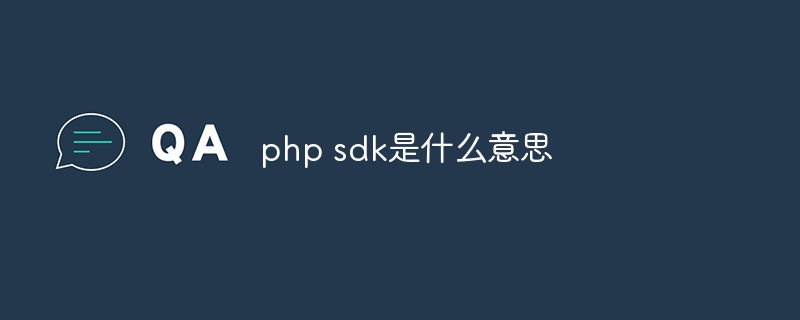Home >Backend Development >PHP Problem >What does php sdk mean?
What does php sdk mean?
- PHPzOriginal
- 2023-04-04 09:14:13982browse
php sdk is a toolkit that encapsulates all API interfaces of the log service; users can call all API interfaces of the log service through the log service PHP SDK; users can introduce logs in the project through "require_once" Service SDK interface.

#The operating environment of this tutorial: Windows 10 system, PHP8 version, Dell G3 computer.
What does php sdk mean?
The Log Service PHP SDK encapsulates all API interfaces of the Log Service. You can conveniently call all API interfaces of the Log Service through the Log Service PHP SDK.
Installation method of PHP SDK
Prerequisites
The log service has been activated. For more information, see Activate Log Service.
AccessKey has been created and obtained. For more information, see Access Keys.
Alibaba Cloud account AccessKey has access rights to all APIs, and the risk is very high. It is strongly recommended that you create and use RAM users for API access or daily operation and maintenance. RAM users must have permission to operate log service resources. For specific operations, see Authorizing RAM users.
The PHP development environment has been installed. For more information, please see the PHP official website.
The Log Service PHP SDK supports PHP 5.2.1 and above. You can check your installed PHP version by executing the php -v command.
Install PHP SDK
Download the latest PHP SDK package.
Unzip aliyun-log-php-sdk-master.zip.
Copy the directory extracted in step 2 to the project folder.
PHP SDK is a software development kit and does not require additional installation operations. In addition to the SDK code, the PHP SDK package also includes a set of third-party dependency packages and an Autoloader class to simplify your calling process.
You can introduce the Log Service SDK interface into the project through require_once.
require_once realpath(dirname(__FILE__) . '/../Log_Autoload.php');
Recommended learning: "PHP Video Tutorial"
The above is the detailed content of What does php sdk mean?. For more information, please follow other related articles on the PHP Chinese website!

